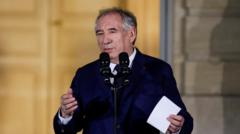François Bayrou, a seasoned centrist leader and mayor from the south-west, has taken the reins as France's latest Prime Minister, succeeding Michel Barnier amid ongoing political strife. In his inaugural remarks, Bayrou acknowledged the Herculean challenge he faces, characterizing the reduction of France's budget deficit and public debt as not only a fiscal necessity but a moral obligation. He described the debt situation as akin to a "Himalayan" task that must be seriously addressed, asserting, "Passing it on to one's children is a terrible thing to do."
His appointment comes in the wake of significant political deadlock following Emmanuel Macron's decision to call snap parliamentary elections after disappointing results in the EU elections. In a moment underscoring the tension of the moment, Barnier was ousted by MPs less than two weeks ago, primarily due to opposition from both the far-right and the left against his budget proposals.
Bayrou's political tenure is expected to be marked by attempts to establish a working coalition in a fragmented national assembly where Macron's party currently lacks a clear majority. The Socialist Party has already indicated their intent to remain in opposition despite expressing a readiness to engage in discussions with Bayrou. Meanwhile, the far-left disgruntlement, represented by leaders like Manuel Bompard, suggests complications ahead, with threats of a no-confidence vote looming.
Despite the obstacles, Bayrou comes with a reputation for negotiation and compromise, essential tools in navigating the current landscape where each political faction seeks to advance its own agenda. Macron, still committed to serving until 2027, has held discussions with various leaders aiming to foster a cohesive government collaboration, excluding the far left and far right from the talks.
Bayrou’s ascension has been met with skepticism from some observers, noting that the previous government quickly faced significant opposition, which could be a precursor for his own administration. Nevertheless, important figures from both the left and right have indicated a willingness, to some extent, to support methods aimed at addressing pressing issues like immigration and the cost of living—though vague enough to signal the potential for ongoing contention.
As political factions recalibrate their strategies following the recent upheaval, the Prime Minister's role stands as pivotal for renewing public confidence in the French government. With a path marred by challenges, the question remains: can François Bayrou bridge the divides and steer France toward fiscal responsibility and political stability?




















